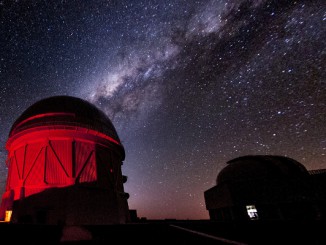Just like “planetary nebulae” have nothing to do with planets, “cometary globules” have nothing to do with comets. But the relatively small, isolated clouds of gas and dust in the Milky Way glow faintly in the light of nearby stars, forming intriguing structures that stretch across light years. This view of cometary globule CG4, captured by the European Southern Observatory’s Very Large Telescope in 2015, shows the “head” of the structure gaping upward like the open maw of some titanic beast, with an unseen tail stretching out eight light years below. CG4 is located some 1,300 light years from Earth in the constellation Puppis.

A zoomed-out view from the National Science Foundation’s Victor M. Blanco 4-metre telescope shows CG4’s tail and its imaginary prey, a galaxy more than 100 million light years away.




